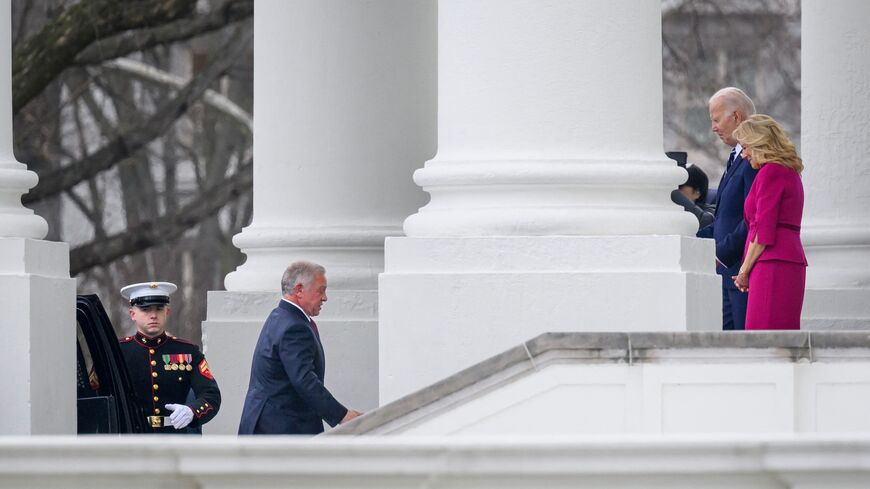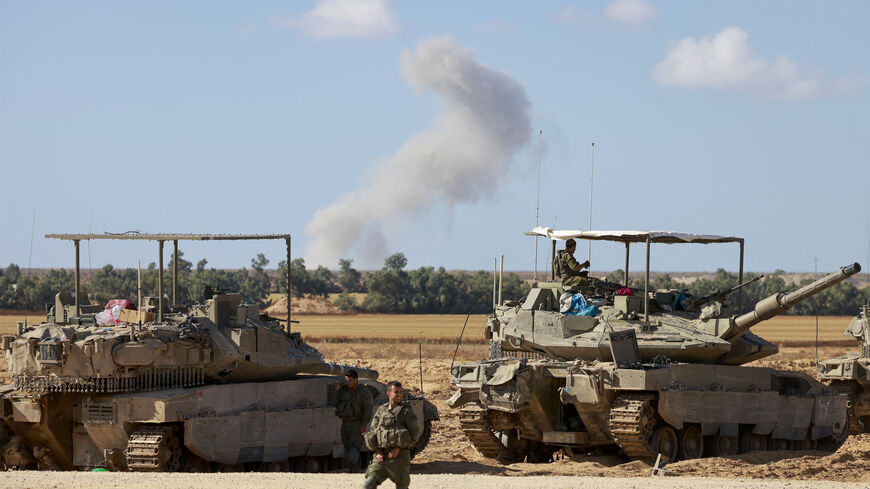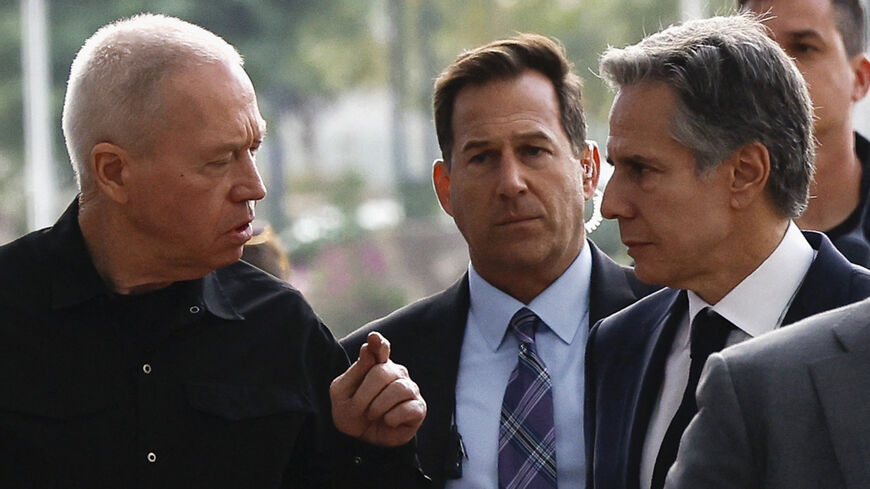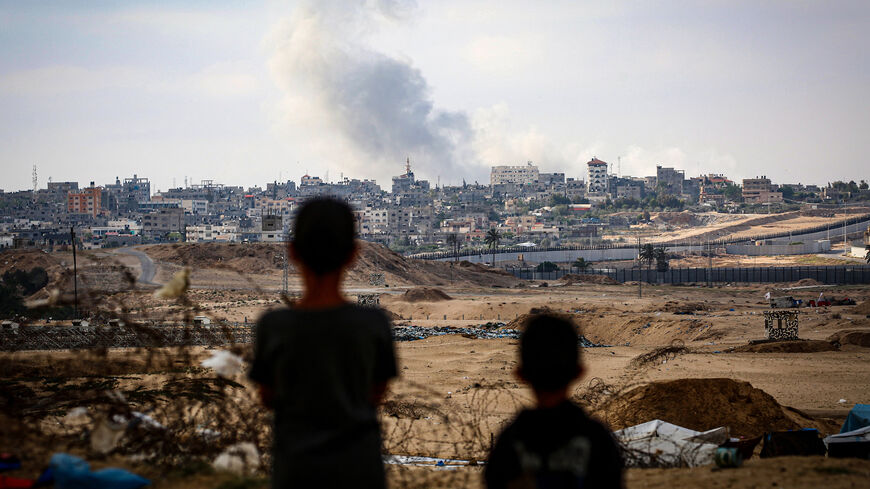Israel calls on Palestinians to evacuate east Rafah as deal talks reach impasse
Hamas did not publish its exact response to the Egyptian-mediated hostage-release/Gaza cease-fire deal, but for Israel, the rocket fire Sunday on the Kerem Shalom crossing signaled that the group is not interested in reaching an agreement.

Negotiations to reach a deal between Israel and Hamas appeared to reach an impasse on Monday as the Israeli military issued orders to evacuate eastern Rafah, the Hamas delegation left Egypt to Qatar and US officials intensified a last-ditch effort to salvage a cease-fire agreement.
Early Monday morning, the Israeli military began dropping flyers, sending text messages and making phone calls to residents of eastern Rafah, instructing them to evacuate to safe zones.
These measures come after a barrage of rockets was launched Sunday from the Rafah area toward Israel's Kerem Shalom crossing point, killing four Israeli soldiers, and against a backdrop of pessimism expressed over the weekend by Israeli sources over the prospects of reaching an Egypt-mediated cease-fire deal.
Temporary evacuation of eastern Rafah
For the moment, instructions to evacuate only apply to some of the eastern neighborhoods of Rafah and those closer to the border with Israel. These include the environs of the municipality of Al-Shawka and the neighborhoods of Al-Salam, Al-Jneina, Tiba Zaraa and Al-Bayouk in the Rafah area, according to the Israel Defense Force's Arabic spokesperson, Avichay Adraee.
The order, according to the Israeli military, is for a temporary evacuation. "We have started an operation on a limited scale for the temporary evacuation of people living in east Rafah," an unnamed IDF spokesperson told reporters Monday morning.
According to the Israeli military radio station, three Hamas battalions are located in the area. Palestinian and international aid organizations have been informed about the evacuation operation.
The IDF published on social media a map of the expanded humanitarian zone where residents should evacuate to. "We expanded the humanitarian area in Al-Mawasi to accommodate the increased levels of aid flowing into Gaza," noted the IDF.
The "beginning of the Israeli operation in Rafah"
Defense Minister Yoav Gallant spoke Sunday night on the phone with American Secretary of Defense Lloyd Austin, updating him on the latest attack from the Rafah area toward the Kerem Shalom crossing.
A statement issued by Gallant’s office after the conversation said that "Minister Gallant detailed to Secretary Austin the many efforts deployed by Israel to reach an outline for the release of the hostages and a temporary truce, noting that at this stage, Hamas has been refusing any offer that could lead to that." The statement further quoted Gallant as saying that this situation has left Israel with no choice, and that "this means the beginning of the Israeli operation in Rafah."
Israeli fighter jets struck targets overnight in the Rafah area, where the rockets were launched toward Kerem Shalom, including a shooting position and military structures, said the IDF. The Health Ministry in Gaza reported that 26 people were killed in the attack.
Hamas takes negotiations back to Qatar
The Egypt-mediated deal submitted last Sunday to Hamas is composed of three phases. The first calls for the release of 33 hostages, mainly female, within 40 days in exchange for the release of a few hundred Palestinian prisoners incarcerated in Israel, and the withdrawal of Israeli troops from the main urban centers to allow displaced Gazans to return to the south of the Strip. The second phase would see the release of male hostages in exchange for more Palestinian prisoners and discussions on an extended truce. The third phase would see the return of bodies on both sides.
However, after a day and a half of talks, the Hamas delegation left Cairo on Sunday, saying it insists on Israel completely ending the war in Gaza and the IDF fully withdrawing from the Strip. It also said it was returning to Doha, where the political leadership of Hamas resides, for further consultations.
As such, CIA Chief William Burns arrived in Qatar on Sunday in an effort to salvage the Egypt-mediated deal. Burns will travel to Israel later in the week in what Haaretz described as further pressure on the Israeli premier to back away from his statements over the weekend that he will not forego his plan for a military operation in Rafah.
"Contrary to publications, Hamas is the one blocking the release of our hostages," Netanyahu said in Hebrew in a video clip posted Sunday on social media. "Israel was and still is ready to suspend fighting in order to release our hostages," he said. "We are not ready for a situation where Hamas battalions will come out of their tunnels, retake Gaza, rehabilitate their military infrastructure and start threatening again Israeli citizens. That is why Israel will not agree to the demands of Hamas, which mean surrender, and will continue fighting until all our goals are achieved."
Netanyahu’s statements pledging a Rafah operation pushed Hamas to harden its demands after the two sides got close to reaching a deal a few days ago, an unnamed Israeli official told The New York Times on Monday. According to the official, Hamas is now demanding additional guarantees that Israel will not resume fighting and launch an invasion of Rafah after any agreement.
Reacting to The New York Times publication, a statement from Netanyahu's office denied it was him blocking the deal. "This is a lie and purposely misleading the public," read the statement.
Thousands of Israelis have been demonstrating over the weekend, calling for Netanyahu to reach a hostage-release deal and blaming him for blocking it on purpose. In contrast, members of Gvura Forum, which represents families who lost children or soldiers in the Gaza fighting, announced they will start a hunger strike on Monday evening, when Holocaust Remembrance Day in Israel ends, until the IDF enters Rafah.
President Joe Biden spoke with Prime Minister Netanyahu on the phone in a conversation that lasted half an hour. Before the conversation, a spokesman for the White House National Security Council told Agence France-Presse, "We have made our views clear on a major ground invasion of Rafah to the Israeli government, and the president will speak with the prime minister today. … We continue to believe that a hostage deal is the best way to preserve the lives of the hostages and avoid an invasion of Rafah where more than a million people are sheltering."
Palestinian and Arab reactions
Hamas vowed on Monday that its military wing would render an Israeli military operation in Rafah unsuccessful.
"Any military operation in Rafah will not be a picnic for the fascist occupation army. Our valiant resistance, led by the al-Qassam Brigades, is fully prepared to defend our people, defeat this enemy, thwart its plans and subvert its goals," said the group in a statement carried by the affiliated Safa news agency.
Meanwhile, Hezbollah announced a new drone attack on Israeli forces on Monday. In a statement carried by its news agency, Al-Manar, the Lebanese military organization claimed to hit Israeli military positions south of Metula, located near the Lebanese border. The strike caused damage to vehicles and led to casualties, per Hezbollah.
The Egyptian government did not formally comment on the situation on Monday. The state-affiliated Al-Qahera News reported on Monday that the cease-fire talks broke down due to the Kerem Shalom strike.









